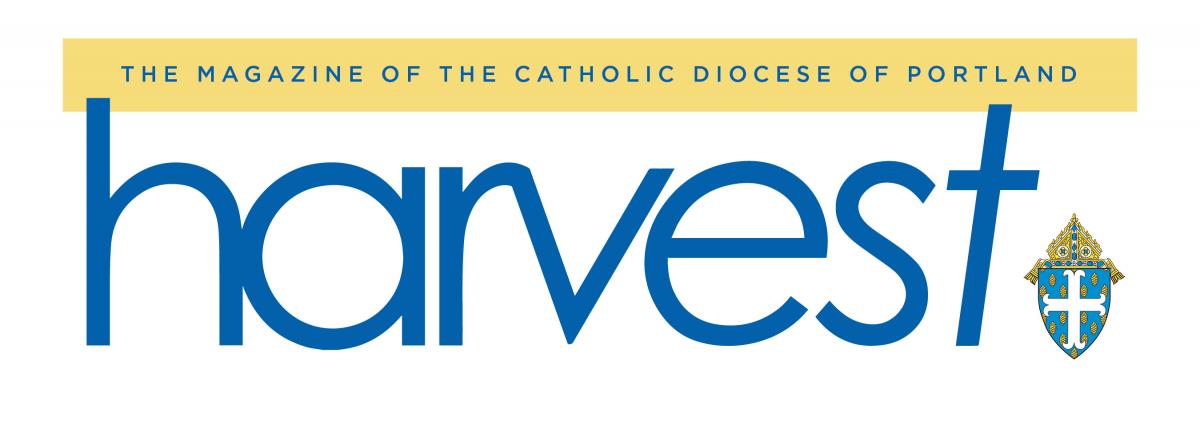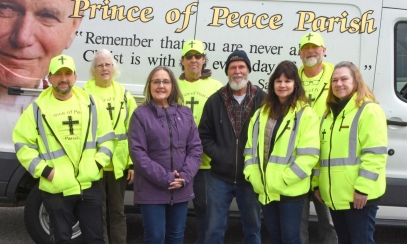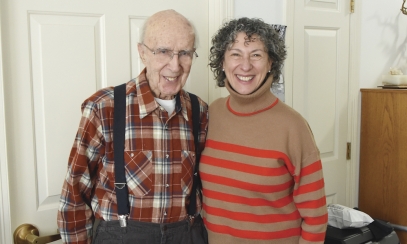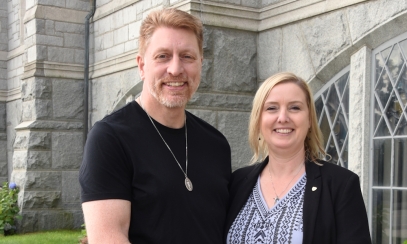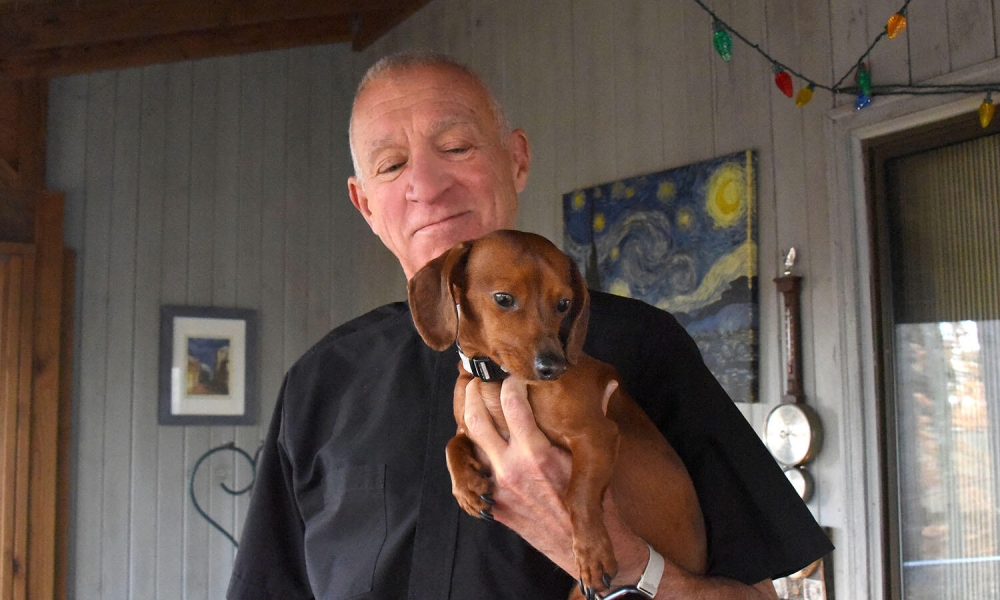
Priests and their pals
Following the Friday morning Mass at Our Lady of Perpetual Help Church in Windham, Father Louis Phillips, the pastor, likes to head to the parish hall for coffee and conversation with parishioners. But as much as parishioners look forward to having their pastor join them, there is someone whose arrival may be anticipated even more — Father Phillips’ dachshund, named Windham.
Following the Friday morning Mass at Our Lady of Perpetual Help Church in Windham, Father Louis Phillips, the pastor, likes to head to the parish hall for coffee and conversation with parishioners. But as much as parishioners look forward to having their pastor join them, there is someone whose arrival may be anticipated even more — Father Phillips’ dachshund, named Windham.
“Windham is so funny. He leaves Father’s side and comes charging at the door, and if it’s not open, he jumps on it to get in. As soon as the door is open, he just comes like a beeline into the hall. It’s so cute. He just knows it’s his home,” says Rose Marie Guay, a parishioner.
“He really has learned how to work a room. He’ll go from person to person. While he’s getting petted by one, he’s already looking to see where he’s going to go next,” says Father Phillips.
Father Phillips is one of many priests around the Diocese of Portland who own dogs. Walk into Father Kevin Martin’s office at St. Mary of the Visitation Parish in Houlton and you might see Lucy Marie, a black labrador retriever, playing with one of her toys. When Father Robert Lupo, pastor of Immaculate Heart of Mary Parish in Auburn, settles in to pray the Liturgy of the Hours, his dog, Kirby, patiently curls up in the chair next to him. When Father Steven Cartwright returns home after a day serving at the Parish of the Holy Eucharist in Falmouth, Levi, his laid-back English bulldog, is there to greet him.
“Sometimes, he will just open his eye and look at me and go back to sleep,” Father Cartwright says with a smile.
There are also Bella and Fia and Sienna and many others.
Father Phillips has owned Windham since 2022 and has been a dog owner since the late 1990s when he served as director of the St. Paul Center in Augusta. While he says he never had dogs growing up, it was suggested that he get a dog for security reasons. He discovered that Baxter was not only a great companion but a great ambassador.
“We would rent rooms to the State of Maine for meetings — different committees, legislative committees, things like that — and sometimes when they made the reservation, they would request Baxter, so that really worked out well,” he says.
While Father Phillips admits that a parish is a more challenging environment than a retreat house, he says his dogs have never had trouble fitting in.
“If I’m walking him around the grounds or I bring him to the hall or whatever, generally people, especially kids, will say hello to him before me,” he says.
“He’s an icebreaker. If someone is apprehensive to come in and approach Father, the dog breaks the ice for that. I think he is an attention-getter, too,” says Kathleen March, an office assistant at St. Anthony of Padua Parish, which includes Our Lady of Perpetual Help Church.
Father Phillips says Windham can sometimes serve as a calming presence.
“I think he’s a very sensitive dog. He can pick up on feelings,” Father Phillips says. “There have been times in counseling sessions when he’s there, maybe he’s in the lap of the person, and I find that the person is talking to him, although they’re really talking to me. In that sense, it can be very helpful, obviously only for people who like dogs.”
Father Phillips says having a dog has been good for him, too, a sentiment echoed by other priests with canine companions.
“Having a dog kind of takes me away from myself, I think. I believe it was the monks of New Skete — they’re an Eastern Orthodox order that actually raises German Shepherds — anyway, they’ve written a couple books about raising dogs, and they made the remark that dogs make us less arrogant, and I think that’s true,” says Father Phillips.
“Dogs are happy. They’re loving. They’re not judgmental,” says Father Edward Clifford, pastor of Holy Spirit Parish in Wells and owner of Sienna. “She has personality. Most dogs have a personality. She makes you laugh.”
“I’m just better with a dog than I am without a dog,” says Father Lupo. “I talk to myself a lot anyway, but now I have someone to talk to. There’s always that unconditional love. He teaches you that. Dogs really teach us how to love like God loves because they forgive the bad things you do.”
Monsignor Jean-Paul Labrie, pastor of St. John Vianney Parish in Fort Kent, says what his dog, Fia, has taught him is to remember to take time to appreciate the little things in life.
“They remind you every day that you have to drink lots of water, that you have to get some fresh air, and that, at some point, you do have to play,” he says. “It’s just the focus on what’s important in life: to take time to talk to people, to take time to get some fresh air every day, to take time to be able to appreciate nature. Like this spring, I was going out for our walk, and there was a beaver there that I would not have seen without the dog’s presence. They’re very attuned to things like that, aren’t they?”
“I think they help us put things in proper perspective. If I have had a bad day and I come to him, he doesn’t care if I am having a bad day. He’ll get into my lap and help me realize that, in the big scheme of things, it really wasn’t all that serious,” says Father Phillips.
The priests say their dogs provide a special kind of companionship. It is nice, they say, to have them there to welcome them when they return to the rectory at the end of a long day.
“Maybe in the old days, when you had priests living together, you had more camaraderie or fellowship, but now you’re alone. Ninety-nine percent of us are living alone. It’s nice to have someone to talk to who doesn’t answer back or disagree with you ever,” says Father Lupo. “I was really glad to have him during the pandemic, just to have someone so that you’re not so isolated.”
“When a priest doesn’t have anyone else living with him, having a pet is definitely a blessing because you’re going out at night, going for a walk, getting exercise,” agrees Father Martin.
“When you live alone and you come home every day to an empty house, I think it’s nice to come home to a pet that is always excited to see you,” says Father Cartwright. “You open the door, and you’ve got an animal that’s happy to see you.”
Father Cartwright and the other priests say they believe having a dog also gives them a greater sense of personal responsibility.
“I think it’s a healthy thing for priests to be personally responsible for another living being,” says Father Phillips.
“There is a sense that you’re caring for something directly, not indirectly,” says Father Lupo.
“I take care of all my parishioners, but this is something for me that I also need to take care of in my personal life,” says Father Cartwright. “Levi is very low maintenance, but an English bulldog is a very high maintenance breed.”
Father Cartwright points out that English bulldogs don’t swim or run like other dogs, and while Levi likes to sleep a lot, English bulldogs are prone to medical problems, something that has been the case for Levi who was a rescue dog and came with 42 pages of medical history.
“When I adopted him, he was in the process of getting his right eye removed. His right eye had glaucoma in it, and he has a traumatic history,” says Father Cartwright.
Father Cartwright says it’s something he can relate to because he has poor eyesight in his right eye, the result of a wood chip that hit his eye when he was 10 years old. It has, however, contributed to the extra care that Levi needs.
“He gets eye drops every day. You have to clean his ears frequently. You have to give him baths at least twice a week,” he says.
Still, Father Cartwright will tell you, “He’s just been a great, great dog. He always wants to be where I am.”
While Father Cartwright says Levi pretty much stays at home, other dogs, like Windham and Sienna, are well-known to parishioners and have become part of parish life.
“He attended some of Totus Tuus. He’s really, really good with kids, especially the smaller the better. I think he thinks of them as littermates,” Father Phillips says of Windham, laughing.
“She has a lot of energy, but she loves people,” says Father Clifford, speaking of Sienna. “One time [while serving in Bridgton and Norway] I took her to the youth ministry. When she was a puppy, I took her to children’s faith formation. They were doing Stations of the Cross, and I remember there was a young boy there who wasn’t really participating with the other kids. I said, ‘Can you walk my puppy?’ It was a way to help him feel more comfortable.”
Along with connecting with their parishioners, some of these priests say their collared companions also make them more approachable to community members.
“There is a whole social life that revolves around dogs, and if I did not have my pet, I really would not be a part of that,” says Msgr. Labrie. “For some people, it brings back very good memories of their childhood. For older people, it reminds them of the special pets that they had, so it’s a way to connect with people.”
“I don’t do it all the time, but I go for a two-mile walk around town, and I run into people on the street whom I would never talk with otherwise, other than to say hi. The fact that you are walking with a dog, people actually stop and talk with you,” says Father Martin.
“When I was at St. Thomas Aquinas in Dover-Foxcroft, it’s in the middle of a little neighborhood, so I would walk him around that neighborhood. I was there for six years, so I knew everybody in the neighborhood. There were at least three or four other dog owners and cat owners. We would see each other on the street. We would say hi. Our dogs got along together. You know, I really felt part of that neighborhood. None of them were my parishioners. They were just my neighbors,” says Father Lupo.
While the priests admit that owning a dog can be inconvenient at times — if they’re misbehaving when you need to get to Mass or if you’re headed to a retreat and need to find someone to care for them — they say the benefits outweigh any challenges. As many dog lovers will tell you, the truly difficult part about owning a dog is when you have to say goodbye.
“Every time I’ve lost a dog, it’s kind of a normal reaction to say, ‘I’m not going to do that again,’ not because of love but because I don’t want to go through that heartache. Plus, I think I’m never going to get another dog like that again. But within a few weeks, I’ve always found that I’ve changed my mind because I just miss having the dog there,” says Father Phillips.
Father Lupo says that a book written by Robert M. Drake sums up well the reason that he continues to own dogs:
“The love they give you is worth every bit of the heartache. They teach you how to love without holding back, even when you know it’s going to hurt in the end. And you keep choosing that love because you know it’s one of the best things you’ll ever feel.”
